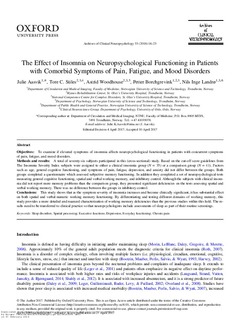| dc.contributor.author | Aasvik, Julie Kristine | |
| dc.contributor.author | Stiles, Tore C | |
| dc.contributor.author | Woodhouse, Astrid | |
| dc.contributor.author | Borchgrevink, Petter Chr. | |
| dc.contributor.author | Landrø, Nils Inge | |
| dc.date.accessioned | 2018-02-28T13:41:39Z | |
| dc.date.available | 2018-02-28T13:41:39Z | |
| dc.date.created | 2017-11-27T15:09:55Z | |
| dc.date.issued | 2017 | |
| dc.identifier.citation | Archives of clinical neuropsychology. 2017, 33 (1), 14-23. | nb_NO |
| dc.identifier.issn | 0887-6177 | |
| dc.identifier.uri | http://hdl.handle.net/11250/2487793 | |
| dc.description.abstract | Objectives: To examine if elevated symptoms of insomnia affects neuropsychological functioning in patients with concurrent symptoms of pain, fatigue, and mood disorders.
Methods and results: A total of seventy-six subjects participated in this (cross-sectional) study. Based on the cut-off score guidelines from The Insomnia Severity Index subjects were assigned to either a clinical insomnia group (N = 35) or a comparison group (N = 41). Factors such as age, general cognitive functioning, and symptoms of pain, fatigue, depression, and anxiety did not differ between the groups. Both groups completed a questionnaire which assessed subjective memory functioning. In addition they completed a set of neuropsychological tests measuring general cognitive functioning, spatial and verbal working memory, and inhibitory control. Although the subjects with clinical insomnia did not report more memory problems than the comparison group, they presented significant deficiencies on the tests assessing spatial and verbal working memory. There was no difference between the groups in inhibitory control.
Conclusions: This study shows that as the symptom severity of insomnia increases and become clinically significant, it has substantial effect on both spatial and verbal-numeric working memory functioning. By differentiating and testing different domains of working memory, this study provides a more detailed and nuanced characterization of working memory deficiencies than the previous studies within this field. The results need to be transferred to clinical practice so that neuropsychologists include assessments of sleep as part of their routine screenings. | nb_NO |
| dc.language.iso | eng | nb_NO |
| dc.publisher | Oxford University Press (OUP) | nb_NO |
| dc.rights | Navngivelse-Ikkekommersiell 4.0 Internasjonal | * |
| dc.rights.uri | http://creativecommons.org/licenses/by-nc/4.0/deed.no | * |
| dc.title | The effect of insomnia on neuropsychological function in patients with comorbid symptoms of pain, fatigue and mood disorders | nb_NO |
| dc.type | Journal article | nb_NO |
| dc.type | Peer reviewed | nb_NO |
| dc.description.version | publishedVersion | nb_NO |
| dc.source.pagenumber | 14-23 | nb_NO |
| dc.source.volume | 33 | nb_NO |
| dc.source.journal | Archives of clinical neuropsychology | nb_NO |
| dc.source.issue | 1 | nb_NO |
| dc.identifier.doi | 10.1093/arclin/acx040 | |
| dc.identifier.cristin | 1518994 | |
| dc.description.localcode | © The Author 2017. Published by Oxford University Press. This is an Open Access article distributed under the terms of the Creative Commons Attribution Non-Commercial License (http://creativecommons.org/licenses/by-nc/4.0/) | nb_NO |
| cristin.unitcode | 194,65,25,0 | |
| cristin.unitcode | 194,67,40,0 | |
| cristin.unitcode | 194,65,20,0 | |
| cristin.unitname | Institutt for sirkulasjon og bildediagnostikk | |
| cristin.unitname | Institutt for psykologi | |
| cristin.unitname | Institutt for samfunnsmedisin og sykepleie | |
| cristin.ispublished | true | |
| cristin.fulltext | postprint | |
| cristin.fulltext | original | |
| cristin.qualitycode | 1 | |

